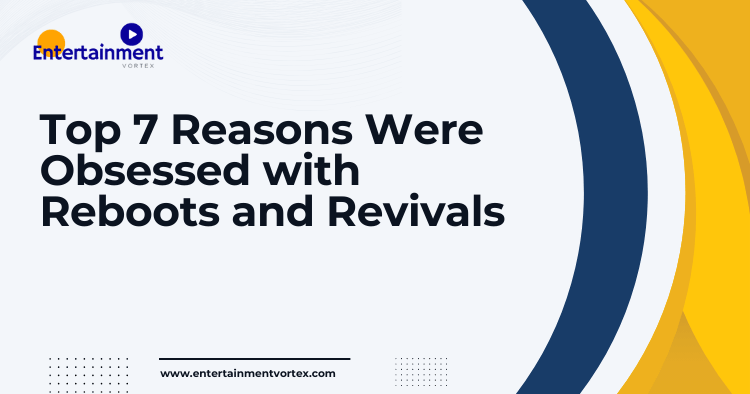Table of Contents
- Nostalgia Hits Hard
- Familiarity Offers Comfort
- Quality of Storytelling
- Modern Perspectives on Classic Themes
- Star Power and the Draw of Familiar Faces
- Reviving Cultural Conversations
- Economic Incentives for Networks and Studios
As we scroll through our streaming platforms, it seems like every other title is a reboot or revival of a beloved series or film. Whether it’s the return of a classic sitcom or a modern twist on a fairy tale, there’s no denying our collective fascination with revisiting the past. But what drives this obsession? Let’s dive into the top seven reasons we can’t get enough of reboots and revivals.
1. Nostalgia Hits Hard
Nostalgia is a powerful emotion. It’s that warm, fuzzy feeling you get when you hear a familiar theme song or see a beloved character back on screen. According to a study published in the Journal of Consumer Research, nostalgia can boost mood and increase feelings of connection with others. Reboots tap into our fond memories, allowing us to relive cherished moments from our youth.
“Memory is the treasure house of the mind wherein the monuments thereof are kept and preserved.” — Thomas Fuller
FAQs about Nostalgia
- Why do people feel nostalgic?
Nostalgia often arises from significant life events or periods, evoking a sense of comfort and belonging. - Can nostalgia impact mental health?
Yes, nostalgia has been linked to improved mood, reduced anxiety, and increased social connectedness.
2. Familiarity Offers Comfort
In an ever-changing world filled with uncertainties, familiar stories provide a sense of stability. When audiences dive back into narratives they already know, it can act as a comforting blanket. This is particularly relevant in turbulent times, where the familiarity of a beloved series can offer a brief escape from reality.
“Comfort is not complacency; it’s a vital part of our emotional health.”
Visual Element: Comfort Ratings
| Show/Film Title | Original Release | Reboot/Revival Release | Comfort Rating (1-10) |
|---|---|---|---|
| Friends | 1994 | 2021 | 9 |
| The Fresh Prince | 1990 | 2022 | 8 |
| Gilmore Girls | 2000 | 2016 | 7 |
3. Quality of Storytelling
Many modern reboots and revivals benefit from advancements in storytelling techniques, production quality, and technology. Writers and producers have the opportunity to re-examine and deepen existing narratives, often creating richer, more engaging stories. This is evident in reboots like The Mandalorian, which expands the Star Wars universe while maintaining the essence of the original saga.
“A story isn’t a story until it’s shared.”
FAQs about Storytelling
- What makes a good reboot?
A successful reboot often respects the original material while offering fresh perspectives and character development. - Are reboots always better than originals?
Not necessarily, but they can provide new insights and make the content relevant to today’s audiences.
4. Modern Perspectives on Classic Themes
Reboots and revivals allow creators to explore timeless themes through a contemporary lens. Issues such as gender, race, and technology have evolved, and revisiting old narratives can shed light on these changes. For example, the revival of The Twilight Zone incorporates modern societal issues while maintaining the essence of the original series.
“Old stories can be new again, but they need a fresh voice.”
FAQs about Modern Perspectives
- How do reboots address contemporary issues?
By updating character arcs and plotlines, reboots can reflect current societal norms and challenges. - Can a reboot change the perception of the original?
Yes, reboots can either enhance the original’s themes or reveal flaws and outdated stereotypes.
5. Star Power and the Draw of Familiar Faces
There’s something special about seeing our favorite actors return to roles that defined their careers. Nostalgic casting can attract viewers eager to see how their beloved characters have evolved. This star power can be a significant draw, as demonstrated by the success of shows like Will & Grace and Roseanne, which saw original cast members reprise their roles.
“Actors don’t just play roles; they become them, and we fall in love with those characters.”
FAQs about Star Power
- Do actors prefer reprising their roles? Many actors enjoy the opportunity to revisit characters they love, often citing nostalgia as a strong motivator.
- How does casting impact the success of a reboot? Familiar faces can draw in audiences, while new cast members can bring fresh energy and perspective.
6. Reviving Cultural Conversations
Reboots can spark important conversations about cultural relevance and representation. By revisiting classic stories, creators can address outdated themes or stereotypes, making space for more inclusive narratives. This has been evident in reboots like One Day at a Time, which reimagines the original sitcom through a modern, multicultural lens.
“Cultural narratives shape our understanding of the world; reboots can reshape those narratives.”
FAQs about Cultural Conversations
- How do reboots influence cultural norms? They can challenge existing narratives and promote diversity, leading to broader discussions about representation.
- Are all reboots successful in this regard? No, some reboots may miss the mark, but successful ones can significantly impact societal views and inspire change.
7. Economic Incentives for Networks and Studios
From a business perspective, reboots are often a safer bet. They come with built-in audiences, reducing the risk of viewer rejection. According to a Hollywood Reporter article, studios are increasingly leaning towards established franchises to maximize profits. This trend has led to a surge in reboots and revivals, as networks capitalize on nostalgia while minimizing financial risk.
“In business, nostalgia is a currency that can yield significant returns.”
FAQs about Economic Incentives
- Why are studios drawn to reboots? They offer a familiar foundation, making it easier to predict audience reactions and revenue.
- Are reboots always profitable? While many are financially successful, not all reboots perform well, especially if they fail to resonate with audiences.
In conclusion, our obsession with reboots and revivals stems from a mix of nostalgia, comfort, quality storytelling, modern perspectives, star power, cultural relevance, and economic incentives. As we continue to embrace these familiar tales, it’s clear that the past remains an integral part of our present and future. So, what’s your favorite reboot? Let us know in the comments!
Also look for insights on how creativity can be sparked through hobbies, as explored in our article on 10 Easy DIY Projects for Beginners to Spark Creativity. For those interested in the cultural significance of storytelling, check out our piece on 10 Fascinating Facts About Quilting: A Journey Through Time.
For further reading on the impact of nostalgia in media, check out this Harvard Business Review article.






